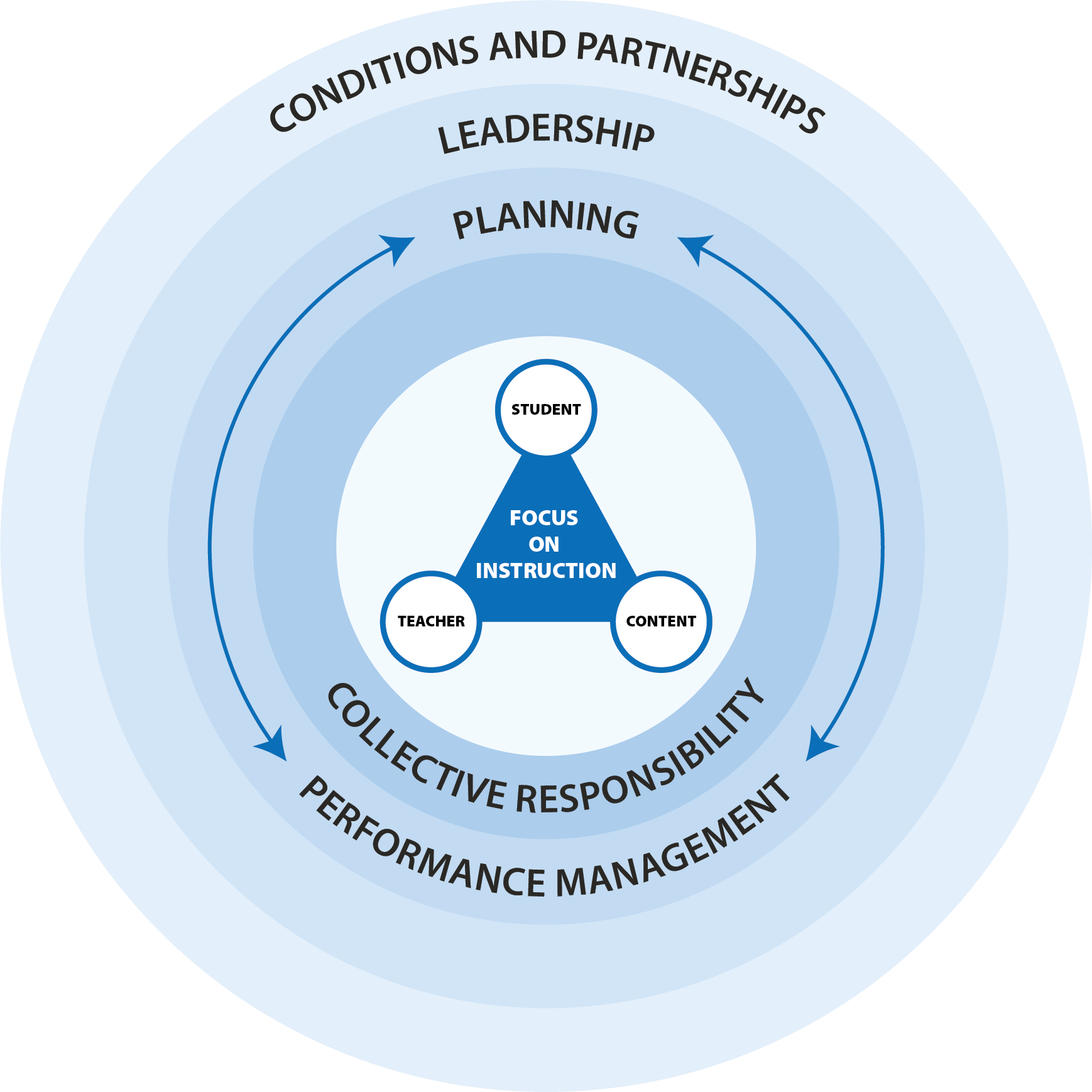Our approach dramatically improves student achievement by transforming education systems, structures, and policies.
Our team of former teachers, school and district leaders, and policy experts build trusting relationships with our partners.
Together, we help our clients build on strengths through continuous improvement.
Theory of Change
With over 25 years of collaboration with schools and school systems nationwide, we asked ourselves, “What factors drive significant improvement in all schools?” Across the spectrum of the fastest improving and highest-performing schools, we identified seven pivotal elements that form our Theory of Change. We believe that by focusing on these elements and eliminating barriers to student learning, schools can substantially improve the outcomes and success of all students.

Focus on Instruction:
Processes and systems help teachers work together to constantly improve and refine standards-based instructional practice, ensuring all students engage in deep learning tasks.
Collective Responsibility:
The school faculty and staff ensure there is a collective responsibility for both the quality of instruction and student access, learning and success.
Planning:
Evidence-based, actionable improvement plans that address the root causes of low performance, informed by a review of existing conditions with input from school, district, and community stakeholders.
Performance Management:
Consistent processes are utilized to monitor and measure plan implementation and outcomes, determine what’s working, and inform efforts to improve.
Leadership:
Leaders who can manage and communicate complexity while maintaining focus on the school’s vision and key priorities.
Conditions:
Sufficient school-level autonomy over people, time, money and program to address the root causes of low performance.
Partnerships:
Partnerships that help the school meet the multiple needs of teachers and students.
The five pillars of our approach
Mass Insight’s partnership approach prioritizes five things:
- Community engagement: we purposefully and systematically work to engage multiple perspectives and ensure that all voices are heard and considered across all levels and aspects of our work;
- Strength on strength orientation: we meet partner schools and districts where they are and leverage their strengths to design customized and effective support;
- Trusting relationships: we foster a culture of trust by prioritizing relationships, responsiveness to partners’ contexts and needs, and take a person-centered approach to communication;
- Thought partnership: we provide strategic support by engaging in active listening, utilizing effective questioning, and promoting collaborative thinking and problem solving; and
- Contextualized support: we customize our support to align with the unique local context and conditions, including tailoring tools, processes, and delivery methods. We also develop, design, and facilitate customized experiences to effectively engage and collaborate alongside our partners.
Customized strategies to meet you where you are.
Diagnostics
Centering stakeholder voices and recognizing the unique context of each of our partners to identify strengths and opportunities for growth.
Planning
Facilitating an inclusive planning process that engages stakeholders, uses data to identify priorities, and develops strategies to improve performance.
Implementation
Directly addressing your priorities and building capacity to successfully implement systems change.
When you work with organizations, you’re looking for somebody who is listening to you, who can be personable, who you don’t wonder if they heard you. And that’s exactly what [Mass Insight] does.
Our Advocacy Work
Mass Insight advances policies focused on removing barriers to student achievement. We are the leading advocate for access to and success in advanced academics because we believe that rigorous, college-level courses contribute to high-quality schools and prepare students for college and careers. We advocate for funding to help high schools diversify and increase enrollment in AP STEM & English courses, AP exam fee subsidies for low-income students, and college credit policies for students achieving a qualifying score on the AP exam.
Latest Policy and Advocacy News
All Over The Map – Webinar
When it comes to the courses high schoolers across the Commonwealth are required to complete for their diplomas, Massachusetts sets few requirements and collects no school level data. Instead, each high school makes their own determination about the courses required...
An Interview with Mass Insight AP Students and their Teacher
https://youtu.be/mQTeW8-sX40 We sat down with two Mass Insight AP STEM & English Program students, Ben and Chris-Ander, and their teacher, William Pellegrino, to hear about their educational journeys, their experiences in AP classes and as vocational students, and...
An Interview with Kristen Hengtgen of The Education Trust
https://youtu.be/1ZfxNShHJOU?si=d1a1GoVrgrDWT5Cu Kristen Hengtgen, Ph.D. is a senior analyst on The Education Trust's P-12 policy team and co-author of their new report, Increasing Access to Advanced Coursework in Massachusetts. In this interview, she joins Mass...



